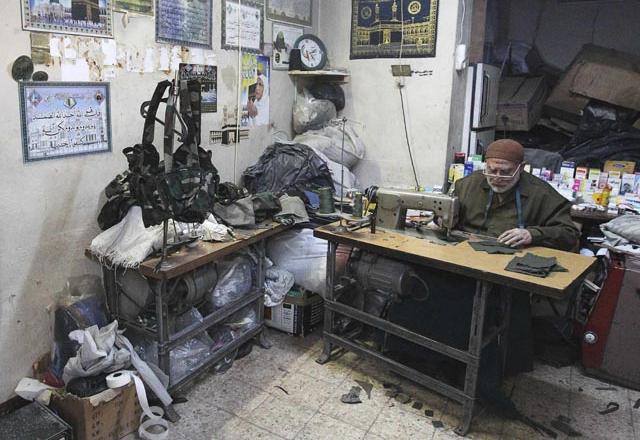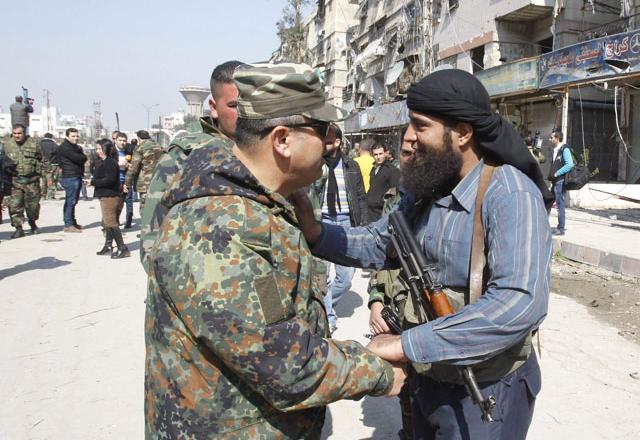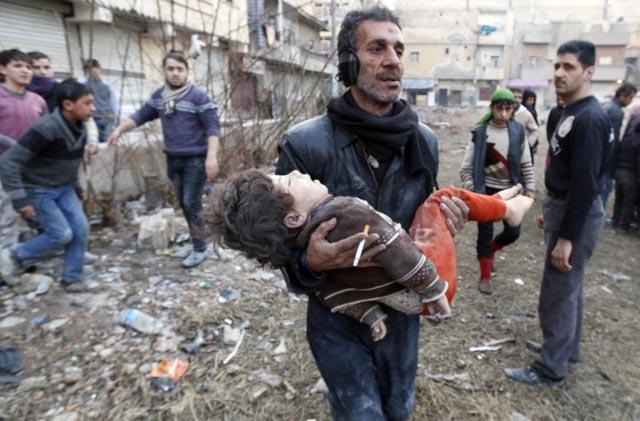ISTANBUL/BEIRUT — Regional unit commanders of the main Western-backed Syrian rebel faction rejected the dismissal this week of their chief by the group’s foreign-based command council and pledged to keep fighting under his command.
Their repudiation of the decision was a further sign of deepening disarray within Syria’s fragmented opposition movement that has weakened the nearly three-year uprising against President Bashar Assad.
Jostling for influence between Saudi Arabia and Qatar, two major patrons of Assad’s civilian and military opponents, has compounded divisions within the opposition. Such factionalism also strengthened Assad in recent US- and Russian-sponsored peace talks between his government and the opposition National Coalition in Geneva that ended without any progress.
The Supreme Military Council of the rebel Free Syrian Army (FSA) dismissed Selim Idriss on Sunday after a tenure that saw numerous setbacks in the anti-Assad insurgency as well as what opposition sources said were rising tensions between him and the National Coalition’s Saudi-backed chief.
A statement by 22 members of the FSA’s 30-strong military council said the decision was prompted by incompetence in the rebel command and a need to improve battlefield leadership.
But Idriss was defiant, saying in a video where he was flanked by regional commanders that they would cut ties with the defence minister in the National Coalition-appointed “temporary government”.
In his video statement released on Wednesday, Idriss called for a reformation of the council to make use of a broader spectrum of rebel groups and urged “revolutionary and military forces on the ground” to present a united front against Assad.
In an online video posted late on Tuesday, unit commanders representing relatively secular rebels in Syria’s five main battle zones denounced the decision to fire Idriss and accused National Coalition leaders of exacerbating rebel divisions.
“[We] consider the dismissal of the head of the General Staff, General Selim Idriss, null and illegitimate,” Fateh Hassoun, FSA commander for central Syria, said in the video. He added Idriss’ backers would keep fighting under his command.
“No group that is not present on the country’s soil has the right to take a crucial decision that does not represent the views of the forces working on the ground,” he said, reading from a statement.
It was not immediately possible to identify all the men in the video, who referred to themselves as “leaders of the fronts and military councils... in Syria” and were dressed in military fatigues.
One of the men, Mohammed Al Aboud, the FSA commander for Syria’s eastern front, confirmed by phone that he opposed the decision, having not been consulted.
Internal disarray
Relations between Idriss and Saudi Arabia deteriorated after he opened channels with Qatar, opposition sources have said.
He was replaced this week by Abdelilah Al Bashir, head of FSA operations in Syria’s southwestern Quneitra province, which borders the Israeli-occupied Golan Heights, in a meeting which sources said was attended by Asaad Mustafa, defence minister in a provisional government set up by the opposition last year.
Mustafa’s office could not be reached for comment.
Monzer Akbik, chief of staff in National Coalition President Ahmad Jarba’s office, denied that the decision to ditch Idriss was politically motivated and said it was made to put someone who was fighting inside Syria in charge.
“They need someone who is fighting on the ground instead of someone who was distant from operations; Bashir was good on the field and has fought several battles,” he said.
An FSA leader who did not want to be named said a lack of resources, not Idriss’ leadership, was to blame for setbacks under his command, such as an incident in December when the FSA lost a border crossing with Turkey to rival Islamist insurgents, which embarrassed the organisation and prompted the United States and Britain to suspend non-lethal aid.
“It’s not about the person. It’s about the resources,” he said. “The corruption is very bad and it’s destroyed the coalition.”
Regardless of its roots, the dispute compounded the disarray within the rebellion, which began as a peaceful protest movement in March 2011 before mushrooming into a civil war that has killed more than 140,000 people.
Many of Syria’s rebel groups had already repudiated the FSA high command, including the Islamic Front, an alliance of some of the most powerful insurgent units in the country.
The Islamic Front in turn has been caught up in weeks of bitter clashes with an Al Qaeda splinter group, the Islamic State of Iraq and the Levant. More than 2,300 people have died this year in rebel infighting alone.














